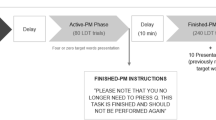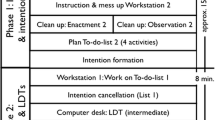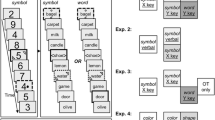Abstract
Recent studies showed that prospective memory (PM) intentions might not be deactivated directly after completion. The residual activation leads to aftereffects which are reflected as interference in performance when former PM cues of old intentions are interspersed in the new task (i.e., intention deactivation failure, Walser et al., J Exp Psychol Learn Mem Cogn 38(4):1030–1044, 2012). In the present study, we investigated potential mechanisms that might support the deactivation process of completed intentions by manipulating the task demands (e.g., working memory load) between intention completion and measurement of aftereffects. Aftereffects on repeated PM-cue trials were found when working memory load was low (control condition), but were reduced when available resources were sparse (working memory load condition). When participants were asked to reflect upon the to-be-deactivated PM cue, subsequent aftereffects were increased. Further, overall aftereffects were larger for participants low in self-reported action control. Results show that the nature of the filler-task activity determines whether the representation of the completed intention is destabilized (working memory load) or strengthened (intention reflection). The (at least partial) overwriting of completed intention representations by new working memory task representations seems therefore to reflect a supporting factor for the deactivation of completed intentions.



Similar content being viewed by others
Notes
Note that in the context of aftereffects of completed intentions the term “deactivation” should not be considered as a deliberate process, but rather refers to a passive process, as participants generally do not receive instructions to actively forget the completed intention representation.
It is nevertheless conceivable that the intention reflection task may also include central executive processing to some extent (e.g., retrieving PM from long-term memory, imaging features, etc.). We thank Suzanna Penningroth for mentioning this point. At the same time, however, this seems not to the extent than classical working memory load tasks that are frequently used to measure the limits of individual working memory capacity as in the tasks included in the working memory load filler task.
The finding of increased RTs on PMREPEATED trials compared to oddballREPEATED trials rules out the alternative explanation that increased RTs on PMREPEATED trials were due to an increased orientation reaction to familiar stimuli. As RTs on oddballREPEATED trials were even faster compared to oddball trials, we used in line with our previous study (Walser et al., 2012) regular oddball trials as more conservative baseline comparison for PMREPEATED trials.
We thank Michael Scullin for highlighting this point.
We are grateful to Julie Bugg for suggesting this analysis.
As participants hardly made any commission errors (overall during 24[0.02%] trials) we only computed an error analysis including all error types (i.e., commission errors, misses, ongoing-task errors). Note that the relatively low commission error rate compared to other paradigms (e.g., Scullin et al., 2012) might be because in our paradigm the symbolic PM information on PMREPEATED trials was completely irrelevant and thus could be ignored for performing the ongoing task. Further, the ongoing task digits which appeared in the PM block and Test block were at random and not associated with the PM cue. In contrast, other studies used specific words as PM cues which had to be processes completely on PMREPEATED trials, thereby increasing the probability of commission errors.
We thank Suzanna Penningroth for suggesting this paradigm.
References
Badets, A., Blandin, Y., Bouquet, C. A., & Shea, C. H. (2006). The intention superiority effect in motor skill learning. Journal of Experimental Psychology: Learning, Memory, and Cognition, 32(3), 491–505. doi:10.1037/0278-7393.32.3.491.
Beckmann, J. (1994). Volitional correlates of action versus state orientation. In J. Kuhl & J. Beckmann (Eds.), Volition and personality: action versus state orientation (pp. 155–166). Seattle: Hogrefe & Huber.
Berman, M. G., Jonides, J., & Lewis, R. L. (2009). In search of decay in verbal short-term memory. Journal of Experimental Psychology: Learning, Memory, and Cognition, 35(2), 317–333. doi:10.1037/a0014873.
Bugg, J. M., Scullin, M. K., & McDaniel, M. A. (2013). Strengthening encoding via implementation intention formation increases prospective memory commission errors. Psychonomic Bulletin & Review, 20(3), 522–527. doi:10.3758/s13423-013-0378-3.
Campoy, G. (2012). Evidence for decay in verbal short-term memory: a commentary on Berman, Jonides, and Lewis (2009). Journal of Experimental Psychology: Learning, Memory, and Cognition, 38(4), 1129–1136. doi:10.1037/a0026934.
Einstein, G. O., & McDaniel, M. A. (1990). Normal aging and prospective memory. Journal of Experimental Psychology: Learning, Memory, and Cognition, 16(4), 717–726. doi:10.1037/0278-7393.16.4.717.
Emerson, M. J., & Miyake, A. (2003). The role of inner speech in task switching: a dual-task investigation. Journal of Memory and Language, 48(1), 148–168. doi:10.1016/S0749-596X(02)00511-9.
Goschke, T. (2000). Intentional reconfiguration and involuntary persistence in task set switching. In S. Monsell & J. Driver (Eds.), Control of cognitive processes: attention and performance XVIII (pp. 331–355). Cambridge: MIT Press.
Goschke, T., & Kuhl, J. (1993). Representation of intentions: persisting activation in memory. Journal of Experimental Psychology: Learning, Memory, and Cognition, 19(5), 1211–1226. doi:10.1037/0278-7393.19.5.1211.
Jostmann, N. B., & Koole, S. L. (2010). Dealing with high demands: the role of action versus state orientation. In R. H. Hoyle (Ed.), Handbook of personality and self-regulation (pp. 332–352). Oxford: Wiley-Blackwell.
Kazén, M., Kaschel, R., & Kuhl, J. (2008). Individual differences in intention initiation under demanding conditions: interactive effects of state vs. action orientation and enactment difficulty. Journal of Research in Personality, 42(3), 693–715. doi:10.1016/j.jrp.2007.09.005.
Kliegel, M., McDaniel, M. A., & Einstein, G. O. (2008). Prospective memory: cognitive, neuroscience, developmental, and applied perspectives. New York: Taylor & Francis Group/Lawrence Erlbaum Associates.
Kuhl, J. (1994). Action versus state orientation: psychometric properties of the Action Control Scale (ACS-90). In J. Kuhl & J. Beckmann (Eds.), Volition and personality: action versus state orientation (pp. 47–59). Seattle: Hogrefe.
Marsh, R. L., Hicks, J. L., & Bink, M. L. (1998). Activation of completed, uncompleted, and partially completed intentions. Journal of Experimental Psychology: Learning, Memory, and Cognition, 24(2), 350–361. doi:10.1037/0278-7393.24.2.350.
Marsh, R. L., Hicks, J. L., & Bryan, E. S. (1999). The activation of unrelated and canceled intentions. Memory & Cognition, 27, 320–327. doi:10.3758/BF03211415.
Marsh, R. L., Hicks, J. L., Hancock, T. W., & Munsayac, K. (2002). Investigating the output monitoring component of event-based prospective memory performance. Memory & Cognition, 30(2), 302–311. doi:10.3758/BF03195291.
McDaniel, M. A., & Einstein, G. O. (2000). Strategic and automatic processes in prospective memory retrieval: a multiprocess framework. Applied Cognitive Psychology, 14(7), S127–S144. doi:10.1002/acp.775.
Meilán, J. J. (2008). Activation and deactivation processes in the postponed intention paradigm. Psychologia, 51(1), 89–97. doi:10.2117/psysoc.2008.89.
Penningroth, S. L. (2011). When does the intention-superiority effect occur? Activation patterns before and after task completion, and moderating variables. Journal of Cognitive Psychology, 23(1), 140–156. doi:10.1080/20445911.2011.474195.
Scullin, M. K., & Bugg, J. M. (2013). Failing to forget: prospective memory commission errors can result from spontaneous retrieval and impaired executive control. Journal of Experimental Psychology: Learning, Memory, and Cognition, 39(3), 965–971. doi:10.1037/a0029198.
Scullin, M. K., Bugg, J. M., & McDaniel, M. A. (2012). Whoops, I did it again: commission errors in prospective memory. Psychology and Aging, 27(1), 46–53. doi:10.1037/a0026112.
Scullin, M. K., Bugg, J. M., McDaniel, M. A., & Einstein, G. O. (2011). Prospective memory and aging: preserved spontaneous retrieval, but impaired deactivation, in older adults. Memory & Cognition, 39, 1232–1240. doi:10.3758/s13421-011-0106-z.
Scullin, M. K., Einstein, G. O., & McDaniel, M. A. (2009). Evidence for spontaneous retrieval of suspended but not finished prospective memories. Memory & Cognition, 37(4), 425–433. doi:10.3758/MC.37.4.425.
Walser, M., Fischer, R., & Goschke, T. (2012). The failure of deactivating intentions: aftereffects of completed intentions in the repeated prospective memory cue paradigm. Journal of Experimental Psychology: Learning, Memory, and Cognition, 38(4), 1030–1044. doi:10.1037/a0027000.
Walser, M., Plessow, F., Goschke, T., & Fischer, R. (2013). The role of temporal delay and repeated prospective memory cue exposure on the deactivation of completed intentions. Psychological Research. doi:10.1007/s00426-013-0510-z.
Webb, T. L., & Sheeran, P. (2007). How do implementation intentions promote goal attainment? A test of component processes. Journal of Experimental Social Psychology, 43(2), 295–302. doi:10.1016/j.jesp.2006.02.001.
Wegner, D. M., Schneider, D. J., Carter, S. R, 3rd, & White, T. L. (1987). Paradoxical effects of thought suppression. Journal of Personality and Social Psychology, 53(1), 5–13. doi:10.1037/0022-3514.53.1.5.
Whitmer, A. J., & Gotlib, I. H. (2012). An attentional scope model of rumination. Psychological Bulletin. doi:10.1037/a0030923.
Acknowledgments
We thank Dana Hantusch, Guanyu Huang, Lea Kern, Julia Kleindienst, and Marcus Möschl for assistance in data collection. We are grateful to Julie Bugg, Suzanna Penningroth, and Michael Scullin for thoughtful comments on earlier versions of this manuscript. This research was partly supported by the German Research Foundation (DFG) (SFB 940/1-2013).
Author information
Authors and Affiliations
Corresponding author
Electronic supplementary material
Below is the link to the electronic supplementary material.
Rights and permissions
About this article
Cite this article
Walser, M., Goschke, T. & Fischer, R. The difficulty of letting go: moderators of the deactivation of completed intentions. Psychological Research 78, 574–583 (2014). https://doi.org/10.1007/s00426-013-0509-5
Received:
Accepted:
Published:
Issue Date:
DOI: https://doi.org/10.1007/s00426-013-0509-5




